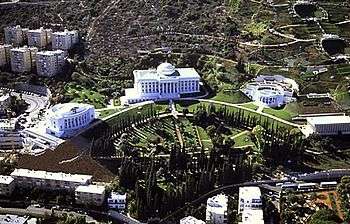Arc (Bahá'í)

The Arc is a number of Bahá'í administrative buildings at the Bahá'í World Centre on Mount Carmel located at Haifa, Israel.[1] They include the Seat of the Universal House of Justice, the Seat of the International Teaching Centre, the International Archives, and the Centre for the Study of the Sacred Texts. A fifth building, the International Bahá'í Library, has yet to be built.[1]
Symbolism
Bahá'u'lláh, the founder of the Bahá'í Faith, in his Tablet of Carmel, wrote that God would "sail His Ark" on Mount Carmel and saying, the mountain will be "the seat of His throne."[1][2] This statement was interpreted by Shoghi Effendi, the head of the Bahá'í Faith during the first half of the 20th century, as referring to the establishment of the Universal House of Justice, the governing body of the Bahá'ís; connected with this establishment, the prophecy was linked to a number of administrative institutions which would be established on Mount Carmel.[1] Shoghi Effendi decided that the buildings housing the institutions would be designed on an arc and surrounded by gardens. The fulcrum of arc would be Monument Gardens, which hold the graves of some of the members of the Bahá'í holy family.[3]
Buildings

The first of the buildings to be built was the International Archives. Shoghi Effendi chose the site of the building and its classical style, which has been used as a model for the other buildings.[1][4] While the building was erected under Shoghi Effendi's supervision, but he died before the completion of the interior and thus he was not able to arrange the historic exhibits which he had been collecting.[4] Instead the Hands of the Cause completed and arranged the interior and it was opened to Bahá'í pilgrims during 1961.[4]
Later in 1972, the Universal House of Justice started planning its own Seat.[1] The architect for the project was chosen to be Hossein Amanat in 1973, and construction of the building started in 1973 and was completed in 1982.[1] This 5 1⁄2-story building was situated at the apex of the Arc, and included the chamber where the Universal House of Justice holds its meetings as well as a reception concourse, banquet room, reference library and office space.[1]
The building of the past two buildings to be constructed, the Seat of the International Teaching Centre, and the Centre for the Study of the Sacred Texts was announced in 1987 and started in 1992.[1] At the same time an underground extension to the Archives building were constructed.[1] The Centre for the Study of the Texts was completed in 1999, and the International Teaching Centre was completed in 2000.[5] The fifth and yet to be built building, the International Bahá'í library, is planned to be eventually built at the eastern end of the Arc.[5]
The buildings include bomb shelters as required by law and an underground passage which connects the buildings.[6]
Notes
- 1 2 3 4 5 6 7 8 9 10 Smith, Peter (2000). "Arc, buildings of". A concise encyclopedia of the Bahá'í Faith. Oxford: Oneworld Publications. pp. 45–46. ISBN 1-85168-184-1.
- ↑ Bahá'u'lláh 1994, p. 4
- ↑ Rabbani 1969, p. 261
- 1 2 3 Rabbani 1992, pp. 19–20
- 1 2 Smith 2008, p. 74
- ↑ Bahá’í International Community (2009). "The Bahá'í Gardens: Common Questions". Archived from the original on 15 April 2009. Retrieved 2009-04-12.
References
- Bahá'u'lláh (1994) [1873-92]. "LAWḤ-I-KARMIL (Tablet of Carmel)". Tablets of Bahá'u'lláh Revealed After the Kitáb-i-Aqdas. Wilmette, Illinois, USA: Bahá'í Publishing Trust. ISBN 0-87743-174-4.
- Rabbani, R. (1992). The Ministry of the Custodians 1957-1963. Bahá'í World Centre. ISBN 0-85398-350-X.
- Rabbani, R. (1969). The Priceless Pearl (Hardcover ed.). London, UK: Bahá'í Publishing Trust. ISBN 1-870989-91-0.
- Smith, Peter (2008). An Introduction to the Baha'i Faith. Cambridge: Cambridge University Press. ISBN 0-521-86251-5.
External links
| Wikimedia Commons has media related to Bahá'í Arc. |
Coordinates: 32°48′52″N 34°59′13″E / 32.81444°N 34.98694°E